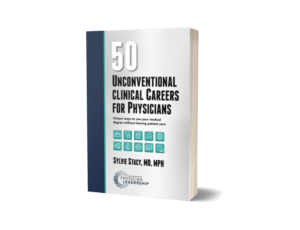Published by Lookforzebras
This guest post is written by Sylvie Stacy, MD, MPH.
It has become so common to hear physicians express dissatisfaction with their careers. Many doctors talk about wanting to step away from medicine or escape from their current work situation. Some are counting down the months or years until retirement. Others are thinking about shifting to a nonclinical role, hoping to use their medical expertise in ways other than direct patient care. Too many are considering leaving the field of medicine altogether.
In today’s most common jobs for physicians (at hospitals and traditional outpatient practices), stressors range from corporate red tape, grueling schedules, and on-call demands, to difficult patient types, burdensome work responsibilities, compensation issues, or geographical constraints.
Luckily, there is a happy medium between the high-stress, fast-paced jobs that are widespread among physicians and the drastic step of quitting or a career change. Within this happy medium is a broad spectrum of job opportunities and career paths where physicians can still engage in medical practice, but in settings or arrangements that alleviate their major frustrations.
I refer to these career opportunities as “unconventional.” They may not immediately come to mind when picturing a doctor’s work, yet they are perfectly valid and potentially more satisfying and fulfilling.
For my new book 50 Unconventional Clinical Careers for Physicians, I interviewed physicians with a variety of less conventional paths. One question I explored was their vision for their professional trajectory and long-term plans for their career. In their responses, I identified three trends that offer insights for medical professionals who are currently feeling dissatisfied, burned out, contemplating leaving medicine, or simply disengaged with their work.
Insight #1 – Doctors with unconventional careers like what they are doing and don’t want to stop
In my conversations with physicians who have chosen unconventional career paths, I picked up on sense of contentment. These physicians aren’t thinking about quitting. They aren’t lusting after a better job.
I asked, “Where do you think your career may take you next?” Here is what they said:
“I actually LOVE what I do, so I intend to maintain my practice for quite some time. It’s very sustainable and the burnout that I suffered from the ER is pretty much non-existent.”
– Physician owner of a ketamine clinic
“This job feels like the one I will retire from.”
– Regional Medical Officer for the United States Department of State
“I have no plans to change where I am in my career right now. I’m very comfortable with my work-life balance.”
– Physician who performs independent medical exams
“I anticipate continuing in both capacities for the foreseeable future.”
– Emergency medicine-trained physician who works part-time in college health and part-time in wound care
“Continuing in outpatient occupational medicine”
– Occupational medicine specialist who works for a national nonprofit with healthcare facilities across the US
“I see a continued role in my current capacities”
– Addiction medicine specialist who serves as the medical director of an Opioid Treatment Program and a staff physician at an outpatient addiction medicine specialty practice
“I don’t think I will ever go back to a full-time employed position.”
– Locum tenens cardiothoracic surgeon
These responses show that unconventional medical careers are not a temporary solution or escape from burnout. They are rewarding, sustainable choices. Stepping away from the traditional path can lead to significant career satisfaction, so much so that you may not have a need or desire to change your course in the future.
Insight #2 – Doctors with unconventional careers want more of the good parts of their jobs instead of wanting to escape the bad parts
Another trend I found among physicians with unconventional careers is their pursuit of more. In contrast to many physicians in conventional roles who are burdened by the negative aspects of their work, these doctors are driven by a desire to amplify the positive aspects.
It is so easy to focus on stressors and frustrations in our jobs and in our lives. It is easy to get grass-is-greener syndrome and assume that being in any other situation would somehow be better. And yet, we often convince ourselves that this is “just the way it is” in medicine. Many doctors don’t consider the lesser-known ways of using their medical degrees, and therefore miss out on the feeling of truly wanting more of what they do on a daily basis.
Here is what the physicians I interviewed look forward to in their careers:
- More opportunities
“With occupational medicine having such a variety of career paths, who knows what opportunities lie ahead.”
– Occupational medicine specialist
- Good compensation
“I have been able to increase my wage slowly over time, making it possible to work less and earn decent money. I have also started doing expert witness work to supplement my income.”
– Surgeon who earns more doing part-time locum tenens work than she did in a permanent full-time job
- Embracing change
“[My job] changes enough that I feel like I have a new job every so often even though I’m with the same organization.”
– Physician employed by the federal government
- Medical practice growth and success
Here are the comments from two medical practice owners:
“I will continue to grow my client base and may eventually need to bring on other physicians to help me with this work.”
“My patients are very grateful and I’m happy to be the ‘captain of my own ship.'”
In a less conventional job, you’re able to see your work as an engaging and rewarding experience in the present moment, rather than as a detour. Doesn’t it sound nice to actively pursue more (eg, more challenges, more learning, more satisfaction) instead of wanting to escape the undesirable aspects of your job?
Insight #3 – Doctors with unconventional careers view their skills as broad and transferrable, even though they are very specialized
Many physicians are interested in a job change or career transition, but believe they don’t have the necessary skills or experience to do anything other than what they are already doing. They believe that they are stuck in their current job (or another one just like it) because they don’t have the necessary skills or experience to do something else — even if something different would make them happier.
In interviewing doctors who work outside of traditional medical practice settings and roles, I was struck by several statements making it clear that they had a different view than most. Like most physicians, they had ample clinical experience and specialization within their fields. But, unlike many others, they viewed their skills as broadly transferrable. They considered their experience as relevant to a wide spectrum of work types and responsibilities.
Here are a few things they said:
The physician owner of a telemedicine specialty practice remarked, “With the artificial intelligence revolution, I am learning AI to be able to integrate it into [my practice].”
A doctor working in correctional healthcare stated that he plans to work as a consultant in order “to offer assistance on developing infrastructure for the delivery of quality health care.”
Several of the interviewees expressed wanting to use their skills and experience to help other healthcare professionals. The owner of a thriving functional medicine practice said, “I am working to adapt and help other physicians do the same.” The addiction medicine specialist stated, “I envision becoming a bigger resource for more ways to reach addiction care needs.” One physician said he plans to develop a curriculum about drug agents, agents, pharmaceutical dynamics, neurophysiology, and treatment modalities in his field.
Learn more about unconventional careers for physicians
For many doctors, traditional health system employment or private practice is not compatible with full enjoyment of life. Rather than dream about the day you can retire, I urge you to explore alternative ways to capitalize on your training and expertise. Rather than tolerate an unfulfilling and stressful job simply because it’s a popular and expected path, look for unconventional opportunities that are better suited for your own unique preferences and needs.

To learn more about the array of unconventional career possibilities in medicine, pick up my new book 50 Unconventional Clinical Careers for Physicians, which was recently published by the American Association for Physician Leadership.

